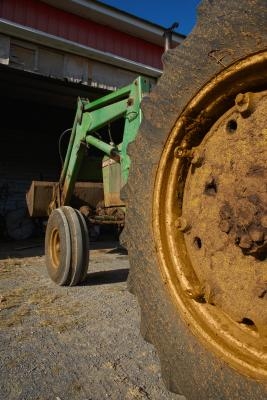
Liquid-filled tires have increased traction, reducing tire spin when pulling heavy farm implements like heavy disks or plows. Yesterdays' Tractor Magazine notes that fluid-filled tires increase the overall gross weight of the tractor. This process increases draw bar pull because more horsepower is delivered through the wheels. Fluid-filled tractor tires are heavy. If you have fluid-filled tires, you will need help to completely remove or replace tires. Begin your tire service by determining whether your tires are tubed or tubeless. Repair and servicing techniques are different for these two styles of tires.
Take safety precautions. Liquid-filled tires often contain corrosive chemicals like antifreeze, alcohol, ethylene glycol or calcium chloride. Always wear sturdy work gloves and eye protection when working with liquid-filled tires. Inform anyone assisting you of the potential dangers. A spray of highly corrosive calcium chloride into your eye after you pull a nail out of your tire will require an immediate trip to the hospital. As you service your tires, thoroughly wash tires if they display little leaks when removed from the rim. Yesterday's Tractor says the rim, tube and inside of the tire should all be thoroughly rinsed. Another safety aspect to take note of is the heavy weight of these tires. Be cautious when lifting your tires; they will sink further into soft ground or mud than other tires.

Inspect your tires visually for fluid leaks or embedded materials that can cause a leak later. Remove these materials, which can include nails, screws, wire and other hardware. Fix any minor leaks. They are easy to identify as small wet spots or puddles on your tire. Canned consumer tire repair kits are available online. The kits are appropriate only for tubeless fluid filled tires. Remember that the chemicals added to the liquid in the tire can cause your repair to deteriorate within a year. Monitor repaired tires closely for fluid leaks in the future.

Inspect your rims regularly and maintain them as well. Calcium chloride in the liquid tire can cause corrosion and severe oxidization (rust) around tractor rims if fluid has leaked there in the past. Prevent rim corrosion by repairing leaks, keeping rims primed and painted and washing off leaked fluid between servicing.
Use professional service for serious leaks or damaged calcium chloride-treated tubed liquid-filled tires. The professionals will pump the corrosive liquid from the tire and dispose of it properly. The tire will be broken down and the tube fixed and refilled.